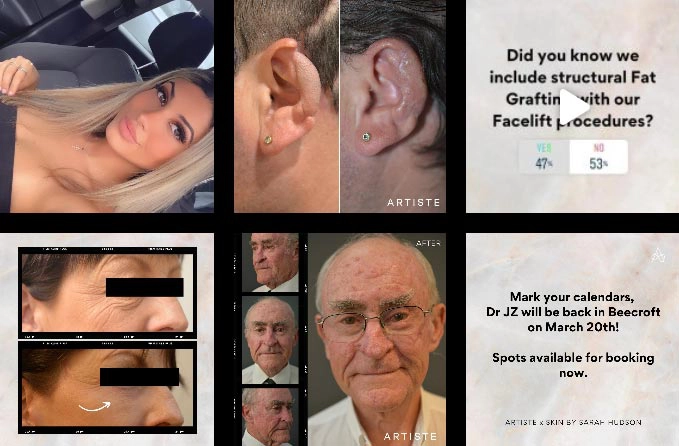How Ageing Affects the Neck and Jawline?
Model featured in photography
As we age, the visible signs of time begin to appear not only on the face but also on the neck and jawline, areas sometimes overlooked in skincare routines. While ageing is a natural part of life, understanding the underlying changes can help individuals to make informed decisions about their appearance. In this blog, we will explore the reasons behind the development of excess skin in the neck and jawline, and the role of collagen and muscle tone.
What Happens to the Skin and Muscles?
Loss of Skin Elasticity
As we grow older, our skin becomes thinner and less elastic due to a reduction in elastin and hyaluronic acid, substances responsible for maintaining skin firmness and moisture. The skin on the neck and jawline, in particular, is delicate, making it more prone to development of excess skin. Gravity and sun exposure aggravate this concern, leading to the formation of loose skin, wrinkles, and folds over time.
Decline in Collagen Production
Collagen is the structural protein that gives skin its strength and resilience. Around the age of 25, collagen production starts to decline at a rate of approximately 1% per year. This depletion contributes to the appearance of fine lines, jowls, and wrinkled skin on the neck, as the dermal layer weakens and loses its ability to ‘bounce back.’
Diminishing Muscle Tone
Ageing doesn’t only affect the skin but also impacts the muscles underlying the neck and jawline. These muscles may lose tone and firmness, causing further drooping in the lower face. The platysma muscles, which run vertically along the neck, can also become more visible over time.
The Formation of Jowls and Loose Skin
One of the most noticeable signs of ageing in the lower face is the development of jowls. These are caused by the loss of skin elasticity and fat redistribution, leading to the development of excess skin along the jawline. Fat on the cheeks can migrate downwards, creating heaviness and affecting contour of the jaw.
Additionally, as the skin of the neck loses elasticity, it begins to droop and form wrinkles. The combination of excess skin and muscle changes can make the neck appear less defined.
If you’re interested in more information about how ageing affects the skin, you may speak to our Specialist Plastic Surgeon, Dr. Jack Zoumaras.
SHARE THIS ARTICLE
Jul01
Facelift Recovery Tips: What Speeds Up Healing and What to Avoid
Disclaimer: At Artiste Plastic Surgery, our Plastic Surgeons led by Dr Jack Zoumaras have been trained to the highest possible degree. All surgery has risks and it is always advised ...
Jul01
How to Prepare for Facelift Surgery: What to Do Before Your Big Day
Disclaimer: At Artiste Plastic Surgery, our Plastic Surgeons led by Dr Jack Zoumaras have been trained to the highest possible degree. All surgery has risks and it is always advised ...
ABOUT ARTISTE
Artiste Plastic Surgery is an Award Winning Specialist Plastic Surgery practice led by internationally trained Dr. Jack Zoumaras, Plastic Surgeon and Peer Reviewed Face Surgeon
Artiste offers the latest Cosmetic Surgical Procedures of the Face, Breast and Body, inspired from leading centres around the world.
STAY IN THE LOOP
Enter your email address below to receive updates on new articles and VIP access to promotions and special offers.
FOLLOW US ON INSTAGRAM










